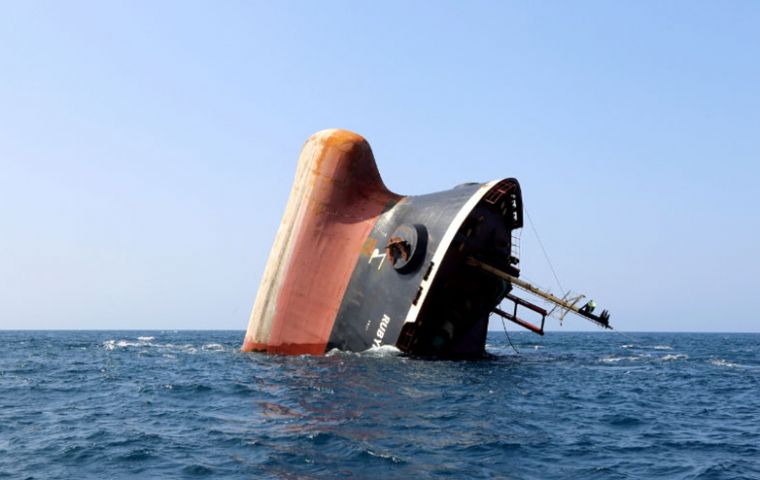MercoPress. South Atlantic News Agency
Western military pressure has been unable to stop Houthis attacks along the Red Sea, IISS report
 However despite the effort, since November 2023 the number of transits of merchant ships through the Red Sea has decreased by roughly 50%.
However despite the effort, since November 2023 the number of transits of merchant ships through the Red Sea has decreased by roughly 50%. The Houthis are growing in strength and trade through the Red Sea is declining despite ongoing international military pressure on the rebel group, a study has warned. The report from the International Institute for Strategic Studies (IISS) said missions such as Operation Prosperity Guardian, Operation Poseidon Archer and EUNAVFOR Aspides had made little impact.
The paper, called Navigating Troubled Waters: The Houthis' Campaign in the Red Sea and the Gulf of Aden, said military strikes had only temporarily disrupted the group's capabilities.
The UK, as well as other Western powers, have made extensive efforts to contain Houthi attacks. Two US Navy destroyers recently shot down Houthi missiles and drones that were targeting three US commercial ships in the Gulf of Aden.
Earlier this year, RAF Typhoons carried out airstrikes against Houthi targets in Yemen, and HMS Diamond downed nine drones and a missile during her six-month mission in the region.
Elsewhere in the southern Red Sea a French destroyer downed drones under the Greek-led Operation Aspides. But despite the effort, since November 2023 the number of transits of merchant ships through the Red Sea has decreased by roughly 50%.
The Houthis, formally known as Ansar Allah, are a Shia-led rebel movement that emerged in the Sa'dah province of Yemen in the 1990s. Initially focused on addressing local grievances against the Yemeni government, the group evolved into a significant military and political force, gaining control of Yemen's capital, Sana'a, in 2014.
Since then, the Houthis have become a central player in Yemen's ongoing civil war, which has drawn in regional powers such as Saudi Arabia and Iran. Backed by Iran, the Houthis have developed an extensive arsenal, including ballistic and cruise missiles, un-crewed aerial vehicles (UAVs) and naval mines.
Since Israel's war in Gaza following the 7 October attacks, the Houthis have expanded their operations to the Red Sea and Gulf of Aden, targeting merchant vessels and launching missile and drone attacks.
Operation Prosperity Guardian is an international naval mission aimed at safeguarding Red Sea trade routes from Houthi attacks. Led primarily by Western powers, including the UK and the US, the operation involves patrolling key maritime chokepoints, escorting merchant vessels and responding to hostile actions.
While the operation has successfully prevented the loss of civilian lives at sea, it has not deterred Houthi aggression or restored pre-2023 levels of maritime traffic.
The question remains, why haven't the Houthis been weakened? The IISS report highlights several factors explaining the Houthis' resilience despite sustained international military pressure: Terrain and concealment, Iranian support, Evolving tactics, refining targeting criteria and weapons system; The use of low-cost, high-impact weapons, such as UAVs and uncrewed surface vessels, places disproportionate strain on the expensive defensive systems of their adversaries, and finally, international operations, including Operation Prosperity Guardian and EUNAVFOR Aspides, are primarily naval and lack ground components, limiting their ability to neutralize Houthi positions or disrupt supply chains.




Top Comments
Disclaimer & comment rulesCommenting for this story is now closed.
If you have a Facebook account, become a fan and comment on our Facebook Page!